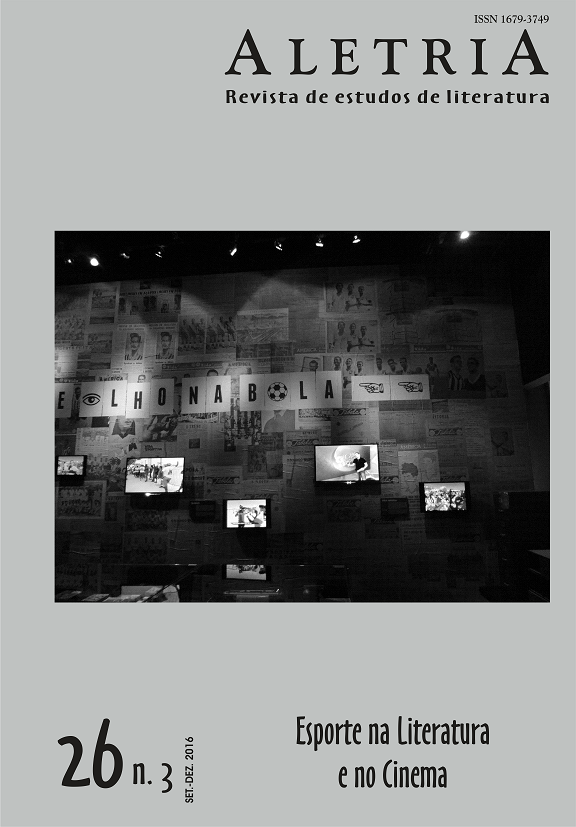Telegraph and Phonograph: Modern Metaphors of Fragmentation in António Nobre and Camilo Pessanha
DOI:
https://doi.org/10.17851/2317-2096.26.3.273-291Keywords:
modernity, fragmentation of the self, art and technology, symbolism, fragmentation of perceptionAbstract
Based on Marshall McLuhan’s Os meios de comunicação como extensões do homem (Understanding media: the extensions of man), this paper aims to discuss how 19th century technological innovation gave rise to the concept of information fragmentation – mainly with the appearance of both phonograph and telegraph – and how this notion relates to changes in human behaviour, mostly in that which concerns self-perception. Such understanding arises in new artistic ways in the 19th century, thus marking the beginning of Modernity, chiefly in Symbolism and Impressionism. Furthermore, in order to prove this theory, two Symbolist poems are analysed: António Nobre’s sonnet 12, focused on telegraph imagery, and Camilo Pessanha’s “Fonógrafo” (“Phonograph”). By analysing both texts we may infer that these technological images might be read as metaphorical synthesis of the split lyrical self, revealed by equally fragmented images, syntax, and rhythm, which are the result of changes in artistic paradigms, bestirred by perception changes brought about by technological innovation.
Downloads
References
AGAMBEN, Giorgio. Ideia da prosa. Tradução de João Barrento. Belo Horizonte: Autêntica, 2013.
BAUDELAIRE, Charles. Les paradis artificiels. Edição de Claude Pichois. Paris: Gallimard, 2009.
BAUDELAIRE, Charles. Sobre a modernidade. Tradução de Teixeira Coelho. 6. ed. Rio de Janeiro: Paz & Terra, 1996.
COSTA, Ivani Ferreira Dias Meneses. António Nobre e a memória como reconstrução poética. 2006. 118 f. Dissertação (Mestrado em Letras) – Faculdade de Filosofia, Letras e Ciências Humanas, Universidade de São Paulo, São Paulo, 2006.
FERNANDES, Annie Gisele. A experiência do contar e a questão da identidade na poesia de António Nobre. In: BUENO, Aparecida de Fátima et al. Literatura portuguesa: história, memória e perspectivas. São Paulo: Alameda, 2007. p. 135-146.
FERNANDES, Annie Gisele; GARMES, Hélder. Apresentação. In: NOBRE, Antônio. Só (seguido de Despedidas). Cotia, SP: Ateliê Editorial, 2009.
GOMES, António Martins. Às armas: o republicanismo na literatura portuguesa entre o 31 de janeiro e o 5 de outubro. 2006. 381 f. Tese (Doutorado em Estudos Anglo-Portugueses) – Faculdade de Ciências Sociais e Humanas, Universidade Nova de Lisboa, Lisboa, 2006.
HOBSBAWN, Eric J. A era das revoluções: Europa 1789-1848. Tradução de Maria Tereza Lopes Teixeira e Marcos Penchel. 20. ed. Rio de Janeiro: Paz & Terra, 2006.
MALLARMÉ, Stéphane. Œuvres complètes. Edição e notas de Henri Mondor e G. Jean-Aubry. Paris: Gallimard, 1974.
MCLUHAN, Marshall. Os meios de comunicação como extensões do homem. Tradução de Décio Pignatari. São Paulo: Cultrix, 1969.
NOBRE, Antônio. Só (seguido de Despedidas). Apresentação e notas de Annie Gisele Fernandes e Helder Garmes. Cotia, SP: Ateliê Editorial, 2009.
PESSANHA, Camilo. Clepsidra. Organização, apresentação e notas de Paulo Franchetti. Cotia, SP: Ateliê Editorial, 2009.
RUBIM, Gustavo. Mudar o registo – da fonografia considerada do ponto de vista poético. Revista da Faculdade de Ciências Sociais e Humanas, Lisboa, Colibri, n. 15, p. 139-151, 2003.
SANTOS, Gilda. Clepsidra, uma via de leitura. In: SANTOS, Gilda; LEAL, Izabela. Camilo Pessanha em dois tempos. Rio de Janeiro: 7Letras, 2007.
SPAGGIARI, Barbara. O simbolismo na obra de Camilo Pessanha. Tradução de Carlos Moura. Lisboa: Instituto de Cultura e Língua Portuguesa, 1982. (Biblioteca Breve, 66).
Downloads
Additional Files
Published
How to Cite
Issue
Section
License
Copyright (c) 2017 Bruno Anselmi Matangrano (Autor)

This work is licensed under a Creative Commons Attribution 4.0 International License.
Authors who publish with this journal agree to the following terms:Authors retain copyright and grant the journal right of first publication with the work simultaneously licensed under a Creative Commons Attribution Non-Commercial No Derivatives License that allows others to share the work with an acknowledgement of the work's authorship and initial publication in this journal.Authors are able to enter into separate, additional contractual arrangements for the non-exclusive distribution of the journal's published version of the work (e.g., post it to an institutional repository or publish it in a book), with an acknowledgement of its initial publication in this journal.Authors are permitted and encouraged to post their work online (e.g., in institutional repositories or on their website) prior to and during the submission process, as it can lead to productive exchanges, as well as earlier and greater citation of published work (See The Effect of Open Access).





